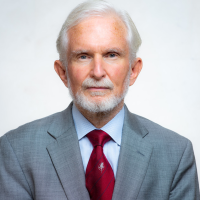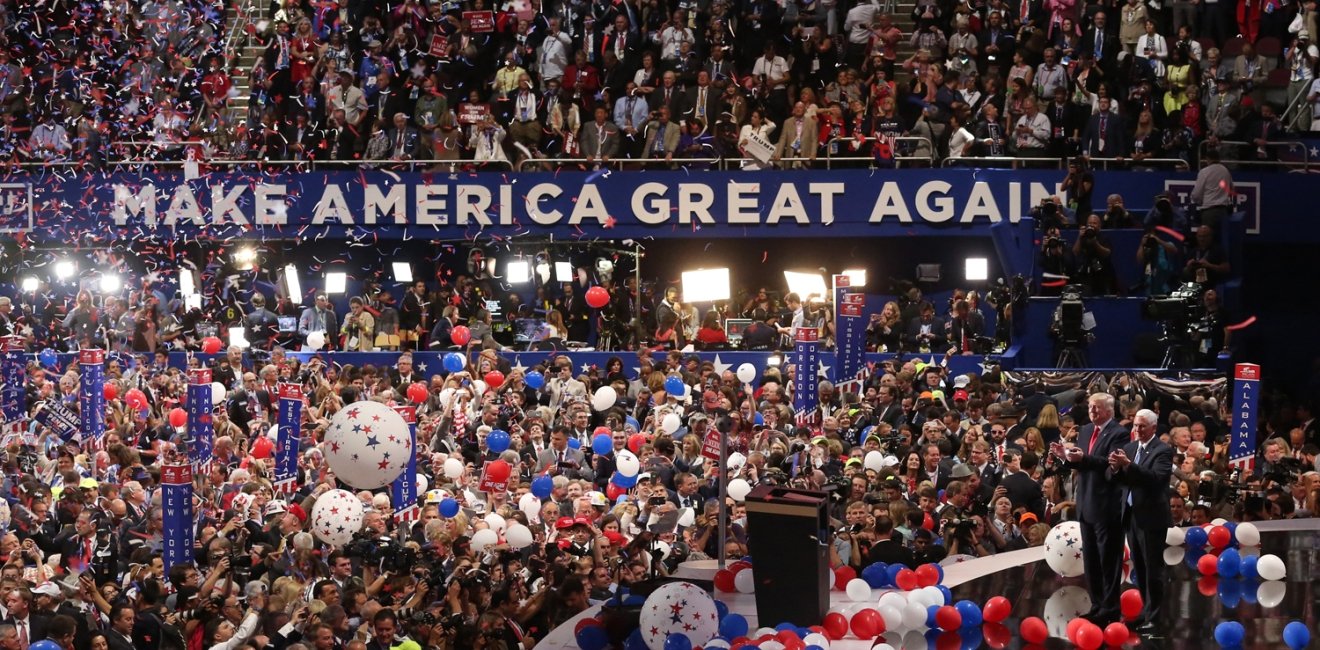
A blog of the Kennan Institute
As part of its “mainstreaming Russia expertise” project, the Kennan Institute is sending experts on Russia to the 2016 Republican and Democratic presidential nominating conventions to assess the potential new administrations’ vision for their relationship with Russia and Ukraine. E. Wayne Merry is a Senior Fellow for Europe and Eurasia at the American Foreign Policy Council and former Political Affairs Officer at the U.S. Embassy in Moscow.
At the Republican Party national convention in Cleveland, serious differences were on display about US policy toward Russia and Ukraine.
To those of us in Cleveland, there were two party conventions to observe. The first was within the convention hall (called the “Q”) and clearly dominated by Donald Trump and his supporters. The second held forth outside the “Q” in a number of fora for more traditional Republican views. (Some of the most important Republicans did not come to Cleveland at all.)
For example, on Tuesday afternoon the International Republican Institute (IRI) sponsored a session for international observers with thirteen important Republican speakers. The first was Ohio Governor John Kasich, himself a presidential candidate this year, who chose not to attend his party’s national convention in his own state. The final remarks came from Speaker of the House Paul Ryan, the senior national-level Republican office holder who also chaired the convention. Not one of the thirteen even spoke the name “Trump” or referred directly to their party’s nominee for president. Kasich did so indirectly, in a litany of policy positions at odds with those of Donald Trump, and most forcefully against the change in the party platform on providing weapons to Ukraine (details below).
In the “Q,” the gap between the traditional Republican establishment and the new party of Donald Trump was quite apparent. The nominee, his family and supporters embraced parts of the American electorate not normally seen as sympathetic to the Republican cause: women, blue-collar workers, minorities, and even gays and lesbians. The theme of freedom, at home and abroad, has been central to Republican rhetoric at least since Ronald Reagan, but it was rarely heard in Cleveland.
Of special note was the absence of Russia as a topic. The two previous Republican presidential nominees, Senator John McCain and Governor Mitt Romney, put Russia near the top of their list of America’s adversaries and overtly vilified President Vladimir Putin. This year, in sessions outside the “Q,” one heard standard Republican warnings about Russia and Putin. Inside the convention, however, the threats to American well-being included globalization and mass migration, Islamic extremism and China, but not Russia.
On Thursday, European visitors to Cleveland were deeply concerned (indeed, shocked) by Mr. Trump’s comments to the New York Times about NATO. While the full interview was more nuanced than the headlines it produced, Trump certainly departed from standard American political rhetoric about the trans-Atlantic alliance. This was a top news story in many European countries, much more so than in the United States. In the interview, Mr. Trump manifested little concern about Russia, focusing on his perception that some NATO members are freeloading on the United States. In consequence, I was treated to a series of intense statements from European diplomats about their countries’ contributions in Afghanistan and the need for American solidarity. None really responded to Mr. Trump’s concerns, or perhaps even listened very clearly to him.
Another issue, Ukraine, demonstrated how much the Trump party is a departure from Republican orthodoxy. Over the past two years, Republicans have vigorously attacked the Obama administration for its refusal to provide lethal weaponry to the government in Kiev in response to Russian-sponsored aggression in eastern Ukraine. Republicans have, in fact, been joined by many Democrats on this issue, making support for Ukraine one of the few truly bipartisan foreign policy issues in the Congress. In reality, more rhetoric than money has flowed from Capitol Hill to Ukraine, but the rhetoric has often been quite emotional.
Last Tuesday morning, in a drafting session of the Republican national “platform” committee, language calling for the provision of lethal weaponry to Ukraine was replaced by an anodyne statement in support of “appropriate assistance.” This change was at the behest of the Trump camp and against forceful arguments in favor of the original language. One insider spoke of a “strong and strident debate” within the party on this issue, on which the Trump preference prevailed. This event provoked more controversy within the Republican discussion fora that I attended than did the more-publicized flap over the supposed plagiarism in Mrs. Trump’s speech the previous evening.
I raised the Ukraine issue in another IRI-sponsored session on Thursday with Dr. Sam Clovis, a senior policy advisor to Mr. Trump. In reply, Dr. Clovis enunciated what one might characterize as a “Trump doctrine” for US foreign relations, one based on an “adult and realistic view of the world” and policies that are “thought through” in terms of costs and consequences. He was clearly doubtful that providing lethal weaponry to Ukraine met those criteria.
It is a truism of American politics that a party’s convention platform says little about what a future administration may actually do in office. Given major improvements in the capabilities and performance of the Ukrainian forces engaged in the Donbas conflict, the question of American weaponry may now be more symbolic than substantive. Nonetheless, symbols are important. I heard several outraged comments from convention delegates that their party would not support weaponry for Ukraine.
This was an issue the Trump camp could have ignored. Changing the platform language on Ukraine offended many loyal Republicans and will earn no votes for the Trump ticket in November. Some attribute the action to Mr. Trump’s campaign manager, Paul Manafort, who has long-standing business and political connections in both Ukraine and Russia. However, Mr. Trump’s more-or-less favorable comments about Russia and Putin predate Mr. Manafort’s role in the Trump campaign.
In Cleveland, all Republicans -- both pro and anti-Trump -- spoke of the presumptive Democratic Party nominee, Hillary Clinton, as evil personified, almost as an Antichrist figure. It will be ironic if she enunciates the thoughts of many Republicans about Russia better than does their own candidate. While Donald Trump calls for tough measures on everything from NAFTA to ISIS to China to NATO, he stands more or less alone this year in American national politics in advocating dialogue and cooperation with Russia.
The opinions expressed here are solely those of the author.
Author


Kennan Institute
The Kennan Institute is the premier US center for advanced research on Eurasia and the oldest and largest regional program at the Woodrow Wilson International Center for Scholars. The Kennan Institute is committed to improving American understanding of Russia, Ukraine, Central Asia, the South Caucasus, and the surrounding region through research and exchange. Read more

Explore More in The Russia File
Browse The Russia File
Chechnya as a Model of Modern Russia

Russia’s Indigenous Communities and the War in Ukraine

Gas and Power in a Changing US–Russia Relationship

